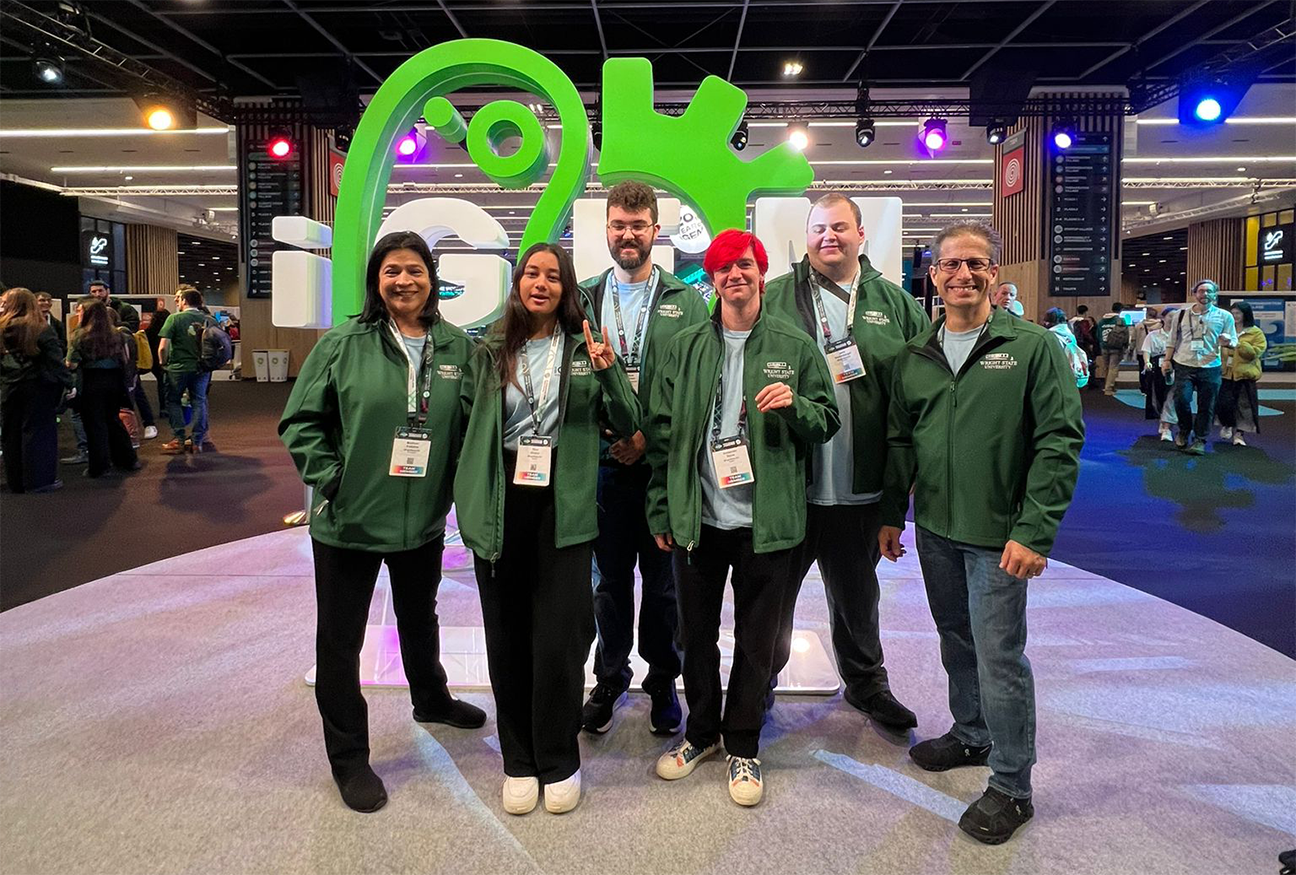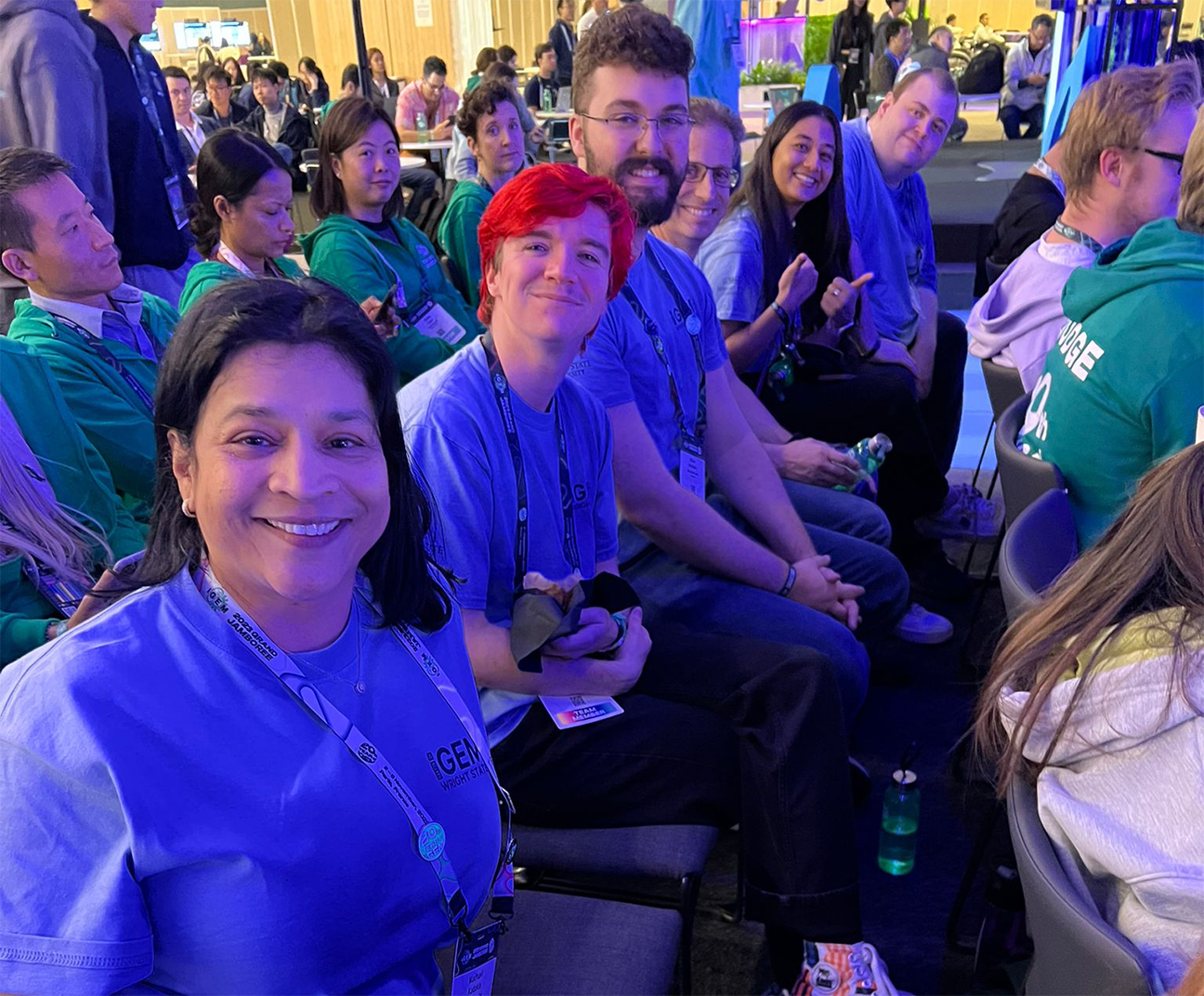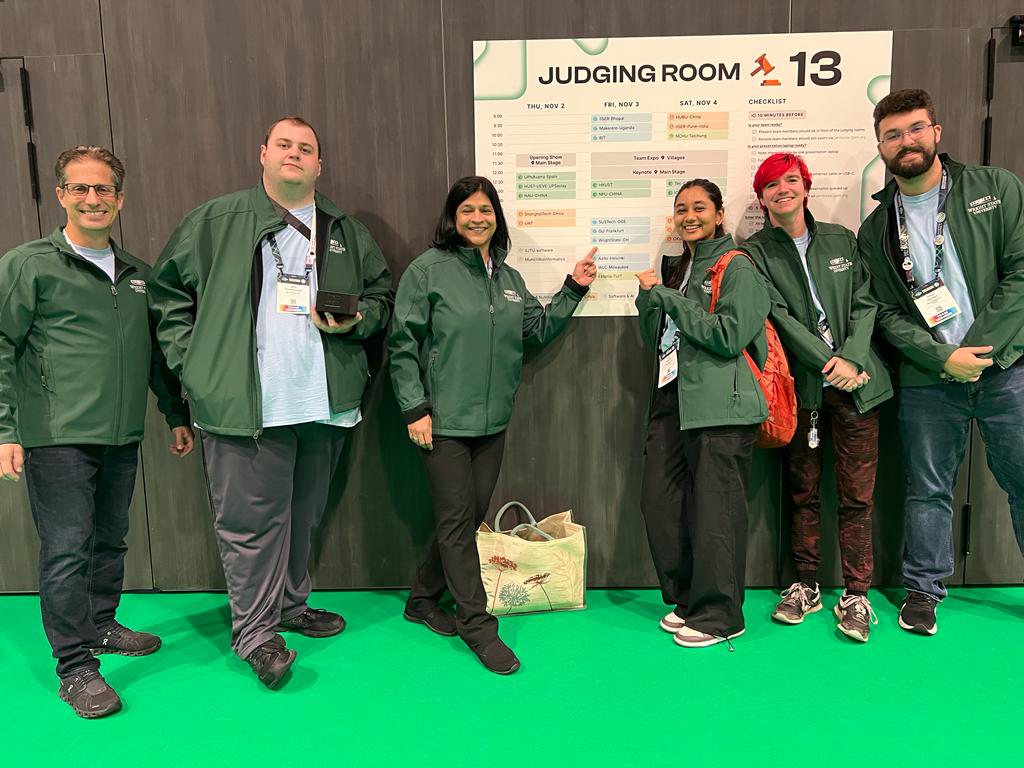AFRL-sponsored science team wins international synthetic biology award for Wright State University
WRIGHT-PATTERSON AIR FORCE BASE, OHIO (AFRL) — The Air Force Research Laboratory, or AFRL, -sponsored Wright State University team took a gold medal award at the annual International Genetically Engineered Machine, or iGEM, Jamboree in Paris, France, Nov. 2-5, 2023. The Jamboree hosted 4,000 attendees, including 400 teams from over 50 countries, according to the organization’s website.
“Biotechnology and synthetic biology are DOD areas of interest,” said Dr. Carletta Sullivan, research biological scientist at AFRL’s Materials and Manufacturing Directorate. “Part of taking advantage of what biotech has to offer depends on having a workforce that is aware of what it can do.”
For its award-winning project, the Wright State iGEM team developed a sensor to detect manganese in water samples. High manganese levels in water are associated with neurologic dysfunction and Parkinson’s-like diseases. The 2023 gold medal follows the team’s silver medal win in 2022 and bronze in 2021. In addition, the 2023 Wright State team received two nominations in special categories: Best Environmental Project and Best Hardware, according to Wright State’s announcement.
The iGEM Competition is a team-based science fair competition for high school, university and post-graduate students focused on using synthetic biology to solve worldwide issues related to health, manufacturing and biotechnology.

The Wright State University International Genetically Engineered Machine, or iGEM, team attends the annual iGEM Jamboree held in Paris, France, Nov. 2, 2023. The Wright State Team, sponsored by the Air Force Research Laboratory, took a gold medal at the Jamboree which hosted 4,000 attendees across 400 teams from over 50 countries, according to the organization’s website. The iGEM Competition is a team-based science fair competition for high school, university and post-graduate students focused on using synthetic biology to solve worldwide issues related to health, manufacturing and biotechnology (Courtesy photo / Dr. Madhavi Kadakia)
“The competition goes through pretty much the whole year,” said Dr. Chia-Suei Hung, research biological scientist at AFRL’s Materials and Manufacturing Directorate. “There are a lot of different components besides the science aspect of it. They organize science outreach events, and they need to look at the impact of the research on society as a whole and how that impact informs their research.”
According to Sullivan, students are often unaware of what synthetic biology and programs like iGEM can provide to engage a wide-range of students.
“We see it as a real way to introduce students to synthetic biology, and they end up getting to meet all these different people, not only from that project; when you go to the jamboree competition, it’s electric,” said Dr. Michael Goodson, research scientist at AFRL’s Human Effectiveness Directorate, part of the 711th Human Performance Wing. “They’re really hyped up about synthetic biology, and it’s such a collaborative atmosphere. That’s why we’ve stayed involved.”
The teams are composed of multidisciplinary students who collaborate with experts from a variety of fields to better understand the potential impact of their research, according to Hung.
“There are computational scientists, marketing students, computer and hardware engineers as well,” said Hung.
According to Wright State University’s announcement of the iGEM win, faculty from both the Dayton and Lake campuses as well as AFRL scientists mentored and advised the team. Dr. Madhavi Kadakia, vice provost for Research and Innovation at Wright State University, secured funding from AFRL for the project, reflecting the commitment to cultivating talent through supporting students and mentors for the iGEM competition.

The Wright State University International Genetically Engineered Machine, or iGEM, team attends the annual iGEM Jamboree held in Paris, France, Nov. 2, 2023. The Wright State Team, sponsored by the Air Force Research Laboratory, took a gold medal at the Jamboree which hosted 4,000 attendees across 400 teams from over 50 countries, according to the organization’s website. Faculty members from both the Dayton and Lake campuses as well as AFRL scientists mentor and advised the teams (Courtesy photo / Dr. Madhavi Kadakia)
“They have their professors that help out day-to-day and we have regular meetings with them to also give feedback on their data,” said Dr. Nancy Kelley-Loughnane, former biological materials and processing research team lead at AFRL’s Materials and Manufacturing Directorate. Currently, Kelley-Loughnane serves as the director of the Tri-Service Biotechnology for a Resilient Supply Chain Program for Office of the Under Secretary of Defense, Research and Engineering. “We’re not as hands-on in the labs anymore, but we’re giving feedback on their experiments and what they should be doing in and out of the lab.”
In addition to sponsorship and mentoring, sponsored teams can access AFRL’s facilities when needed. While Wright State has its own labs and equipment to accommodate the iGEM team, if the team requires additional instruments or analysis, they have access to AFRL’s labs in conjunction with mentoring from its scientists, according to Hung.
“The team chose this project because they were looking at pollution in Ohio and Native American reservations and were interested in developing a biological sensor to detect manganese levels,” said Dr. Amy Breedon, research scientist, AFRL Materials and Manufacturing Directorate. “This year, they also developed hardware that would allow the public to use their sensor to test their water for manganese levels.”
AFRL has been involved with the iGEM competition since 2016 with original support from the tri-service Synthetic Biology for Military Environments and Applied Research for Advancement of S&T Priorities Program, which also funded iGEM teams from the Army and Navy. Recent support has also been provided through a National Defense Education program called Biotechnology Outreach Bolstered through Education in STEM and Development, or BiOBESTD.
“In addition to the opportunity to mentor our local students and Air Force cadets and see their successes, taking part in the iGEM community is also beneficial for us and for AFRL,” Breedon added. “It is a way to stay up to date on the state of the art in the synthetic biology community and build our workforce.”
According to Breedon, multiple students from the AFRL-mentored iGEM teams have transitioned into the AFRL workforce by working part-time in AFRL-sponsored labs during their undergraduate studies and beyond.
“We have … people who have gone from iGEM team members to full-time lab members, including a cadet who finished his master’s [degree] and then came back and is now working in [Materials and Manufacturing Directorate],” said Kelley-Loughnane. “So, it’s not just the civilian side, we have the military side who’ve been able to benefit from as well.”
In addition to the Wright State University iGEM team, AFRL researchers have mentored and sponsored teams from Carroll High School in Dayton, Ohio, and the United States Air Force Academy, or USAFA, in El Paso County, Colorado. The USAFA team also won a gold medal for their project, a system that uses a biosensor to attract, detect and inhibit bacteria that causes Lyme disease called Lyme-AID. This year’s gold was USAFA’s second gold medal in the last four years and won silver in 2002.

The Wright State University International Genetically Engineered Machine, or iGEM, team attends the annual iGEM Jamboree held in Paris, France, Nov. 3, 2023. The Wright State Team, sponsored by the Air Force Research Laboratory, took a gold medal at the Jamboree which hosted 4,000 attendees across 400 teams from over 50 countries, according to the organization’s website. Students from the AFRL-mentored iGEM teams have transitioned into the AFRL workforce by working part-time in AFRL-sponsored labs during their undergraduate studies and beyond (Courtesy photo / Dr. Madhavi Kadakia)
About AFRL
The Air Force Research Laboratory, or AFRL, is the primary scientific research and development center for the Department of the Air Force. AFRL plays an integral role in leading the discovery, development and integration of affordable warfighting technologies for our air, space and cyberspace force. With a workforce of more than 12,500 across nine technology areas and 40 other operations across the globe, AFRL provides a diverse portfolio of science and technology ranging from fundamental to advanced research and technology development. For more information, visit www.afresearchlab.com.
